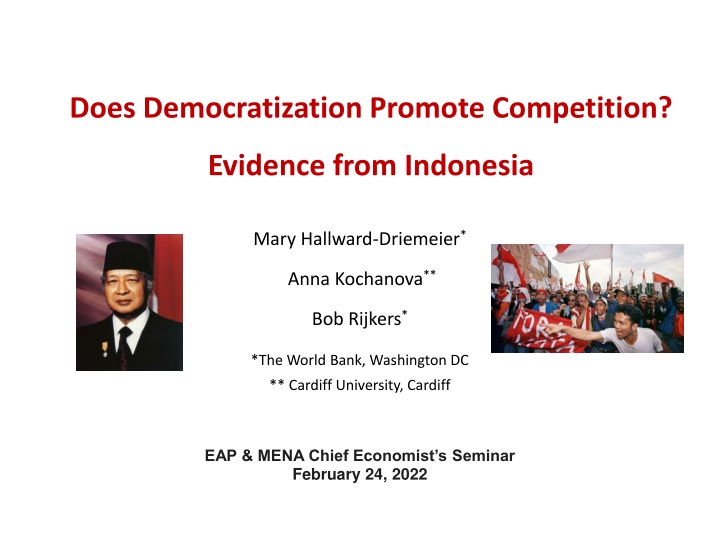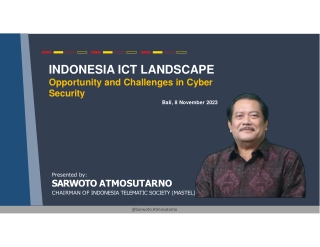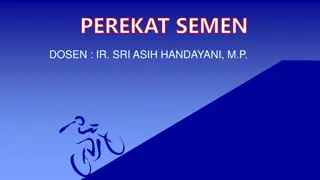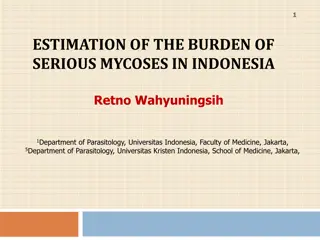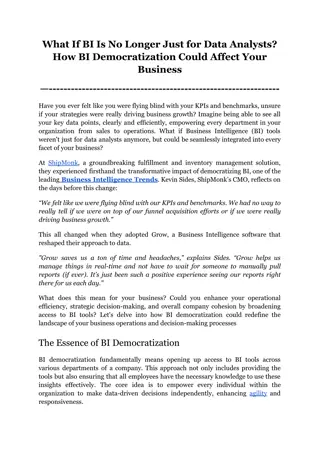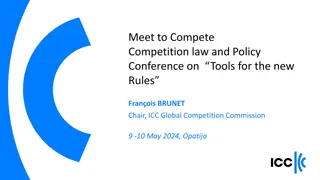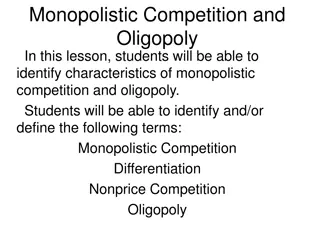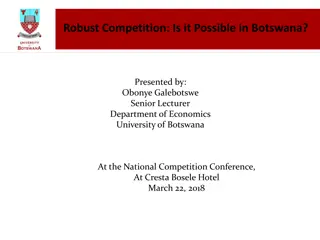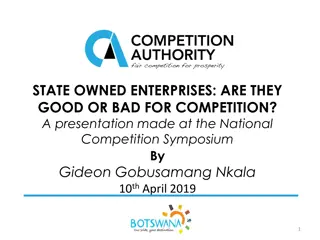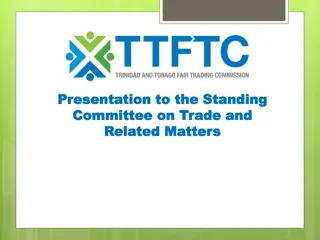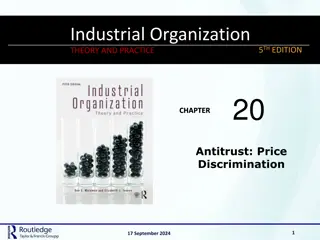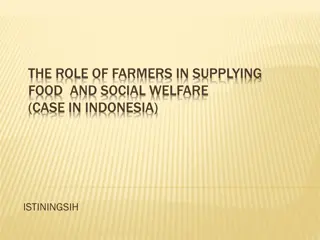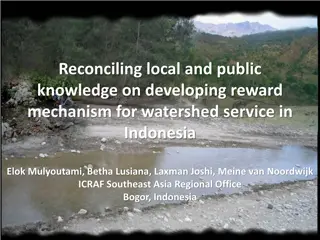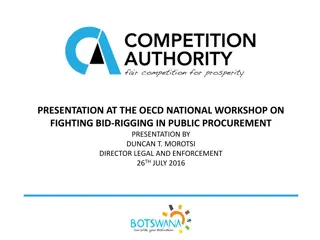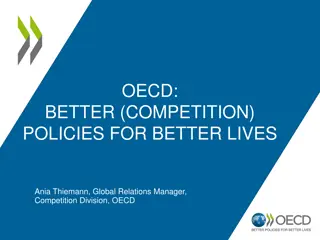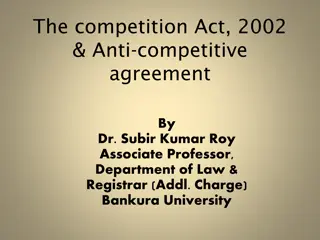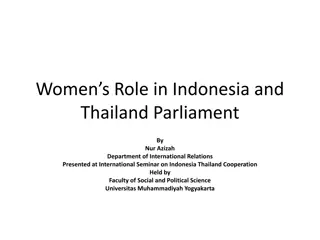Does Democratization Promote Competition? Evidence from Indonesia
This study explores the impact of democratization on economic competition in Indonesia, focusing on the fall of the Suharto regime in 1998 and its effects on market dynamics in manufacturing sectors. The research investigates how severing crony ties to the regime influenced competition and market share in politically connected firms.
Download Presentation

Please find below an Image/Link to download the presentation.
The content on the website is provided AS IS for your information and personal use only. It may not be sold, licensed, or shared on other websites without obtaining consent from the author.If you encounter any issues during the download, it is possible that the publisher has removed the file from their server.
You are allowed to download the files provided on this website for personal or commercial use, subject to the condition that they are used lawfully. All files are the property of their respective owners.
The content on the website is provided AS IS for your information and personal use only. It may not be sold, licensed, or shared on other websites without obtaining consent from the author.
E N D
Presentation Transcript
Does Democratization Promote Competition? Evidence from Indonesia Mary Hallward-Driemeier* Anna Kochanova** Bob Rijkers* *The World Bank, Washington DC ** Cardiff University, Cardiff EAP & MENA Chief Economist s Seminar February 24, 2022
Motivation (How) Does Democracy Promote Growth? (Acemoglu et al., 2019; Papaioannou and Siourounis, 2008; Persson and Tabellini, 2006) Political Institutions impact incentivesfor firms to enter, invest and grow . ...and shape thetrade-offbetween protecting incumbents and promoting entry and demands for redistribution
Governance shapes competition Autocracies Are more prone to corruption and capture by incumbents (Acemoglu, 2008; Treisman, 2000; Chowdhury, 2004) Democracies promote entry by constraining public corruption reduce regulatory protection for incumbent firms Redistribute more (Adser et al., 2003; Rose-Ackerman, 1999) Yet evidence on the impact of democratization on competition is limited
This presentation Does democratization promote economic competition? Exploit the (unexpected) fall of the Suharto regime in 1998 Did the severing of crony ties to Suharto led to enhanced competition in manufacturing sectors disproportionately exposed to cronyism? Epilogue: Tunisia after the Arab Spring
Main Hypothesis Main hypothesis: disruption of political connections had a pro-competitive impact on Indonesian manufacturing industries companies connected to Suharto lose market share more competition in industries where Suharto connected firms accounted for a higher market share Identifying assumption: collapse of the Suharto regime reduced the value of connections to Suharto
Suharto Connections Lost Their Value Stock price responses by Suharto dependence Suharto era Post-Suharto era News about Suharto s Health News About Wahid s Impeachment
Main findings (preview) Politically connected firms lost market share after Suharto s fall, yet remained large Suharto s fall had a modest pro-competitive impact on industries in which his family had extensive business interests relative to industries in which they had not been important players
Context: Suharto era Crony capitalism Mechanisms of capture: licensing access to land and finance, tax breaks and subsidies public procurement mandatory partners in foreign ventures East Asian Paradox rapid growth despite corruption, until the crisis Suharto resigned in May 1998
Context: post-Suharto era Major reforms: democratization, decentralization, and deregulation Many production and trade monopolies were eliminated Restrictions on FDI were relaxed Competition commission was established (KPPU) in 1999 Reforms were often slow and piecemeal (Hadiz, 2004)
Data Annual Manufacturing Survey (Central Bureau of Statistics of the Republic of Indonesia) Virtually all establishments with more than 20 employees, 1993-2009 Data on industry, employment, output, value added, etc. Politically connected firms (Mobarak & Purbasari, 2006) Use event study of stock price reaction to bad news about Suharto s health during 1994-1997 (cf Fisman, 2001) Find all subsidiaries of these connected companies Distinguish between family and cultivated connections Stock prices (Bloomberg) Information on entry regulations from Presidential Decrees
Connected firms matter Contributions of Suharto Family Firms (%) 7 6 5 4 3 2 1 0 Firms Output Labor Imports Exports 1996 2000 2009
Connected firms matter 25 Contributions of (All) Connected Firms (%) 20 15 10 5 0 Firms Output Labor Imports Exports 1996 2000 2009
Connected (family firms) vs nonconnected firms
Connected firms sort into less competitive industries Higher PC presence is associated with Higher output Lower (natural rate of) entry Lower profit elasticity Lower exports
Identification Key challenge: Isolate the impact of loss of political connections from the financial crisis and reforms We exclude 1997-1999 Strategies 1. Difference-in-difference and event study regressions: controlling for industry, year and district fixed effects, and firm and sector-characteristics. 2. Triple-differences regressions: Exploiting the differential timing of the removal of the last Suharto appointed mayors across districts (Martinez-Bravo et al., 2017)
Firm-level Event Study ??? firm age, foreign and state ownership, exporter and importer status ??? external finance dependance, asset tangibility and entry regulation
Connected Firms lost Market Share The evolution of the market share premium on Suharto family connections
Triple-Difference Regression ??????? how long a Suharto appointed mayor remained in office after Suharto s removal (varies from 1 to 4) ??????????:Capture persisted in areas where the Suharto mayors remained in power
The Suharto connectedness premium fell (insignificantly) more when regime change was sudden Impact of political turnover on market share exploiting variation in the tenure of the last Suharto appointed mayors
Industry-level event study ??????? ????????? ???: entry and exit rates; the price cost margin profit elasticity; the Herfindahl-Hirschman index the market share of the four largest companies; the number of firms; prices; composite competition index Z combining all of the above (Kling et al., 2007) Controls: ??? Aggregate foreign and state ownership, Aggregate import and export shares, Entry regulation, Dependence on external finance and asset tangibility
Dynamism improved Dynamism improved and margins fell and margins fell
Concentration increased but prices fell Concentration increased but prices fell
Competition Improved Overall Composite Competition Index COMBINES ALL COMPETITION INDICATORS
Robustness Tests Robustness Tests Alternative proxy for political connections (e.g. broad connections) Adding 3-digit sector-year fixed effects Excluding the most connected sectors Using time-varying controls Adding controls for severity of the crisis
Reconciling the Evidence: Reconciling the Evidence: Puzzle: Big impacts on firms vs limited impacts at the sector level Possible reasons: Nature of state-business relationships changed little: Democratization enabled ascendency of business interests into the political arena Privileges are firm- rather than sector-specific Path dependency: large firms remain large and were able to hold on to their dominant position even after initial privileges were removed
Conclusion Suharto s fall substantially eroded the premium on being connected to him had a modest but significant pro-competitive impact on industries in which his family had extensive business interests relative to industries that did not Democratization can help curb capture, but, by itself, does not suffice to sustain competitive markets
Epilogue: Very Preliminary Results from Tunisia Epilogue: Very Preliminary Results from Tunisia
